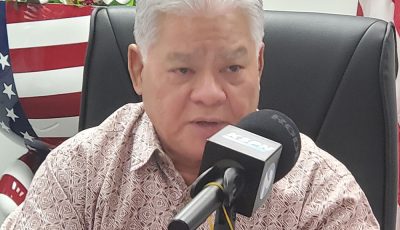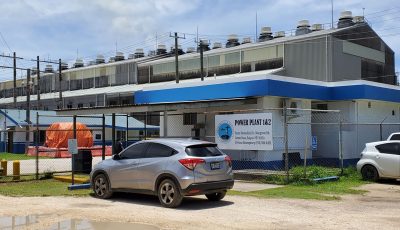NMHC petition to compel court to order property sale is denied
The CNMI Supreme Court has denied the Northern Marianas Housing Corp.’s petition for a writ of mandamus to compel the Superior Court to order the foreclosure sale of a couple’s property after they defaulted on a mortgage and didn’t pay the court’s judgment.

Castro
Chief Justice Alexandro C. Castro and associate justices John A. Manglona and Perry B. Inos ruled that NMHC’s petition is denied as it does not seek relief that would be unavailable on a direct appeal.
The justices said under the factors whether to grant the petition, NMHC fails to make a showing that it is entitled to relief that would be unavailable on direct appeal.
Under the circumstances, the justices said Superior Court Associate Judge Wesley M. Bogdan ordering a status conference to clarify the debt of Lucia and John Wayne Techur before proceeding with foreclosure was not unreasonable.
The justices said NMHC can seek an equivalent remedy on direct appeal and the Superior Court may well order a foreclosure order after the status conference clarifies the state of the debt.
The justices also did not find Bogdan in violation of the Code of Judicial Conduct. They said Bogdan’s order is very clear in the reasoning for issuing the status conference.
In the footnote of their opinion, the justices, however, stated that a comment on the procedural history of this matter and the “apparent discord” between Bogdan and NMHC counsel Michael A. White “is in order.”
The justices said Bogdan scheduled a status conference for months after NMHC’s motion was filed, unnecessarily protracting the resolution of this dispute. The justices pointed out that the information desired from NMHC could have been obtained in short order.
The justices said Bogdan should be mindful of the need to resolve the parties’ dispute expeditiously.
The justices said that Bogdan did not exhibit bias in declining to endorse without question NMHC’s ex parte motion to enforce a 13-year judgment. “Alleging judicial misconduct without clear foundation or seeking the appropriate remedy risks kindling animosity to no good end,” the justices said.
According to the high court’s ruling, Lucia and John Wayne Techur defaulted on a promissory note secured by a mortgage. Thirteen years later, NMHC moved for a foreclosure sale of the property. Bogdan denied the motion and, instead, ordered a status conference for NMHC and the Techurs to present evidence on the current state of the debt.
In 2007, the Superior Court (not Bogdan) entered a default judgment for $90,675. Thirteen years later, in 2020, NMC moved ex parte for a foreclosure. The motion listed an outstanding principal of $88,398 plus interest.
It stated that the motion was made ex parte because NMHC was entitled to the procedural order requested under the statute.
NMHC submitted a proposed order appointing White to sell the property. Bogdan denied the motion because NMHC “failed to provide the court with the necessary information to properly consider its motion relating to a default judgment that has apparently sat inactive (and now totally unexplained) for a very long period of time.”
Bogdan also found the motion lacked explanation for a different principal sum in the motion than in the 2007 default judgment and the legal description of the property to be sold.
Bogdan ordered NMHC to provide an accounting of the debt and set a status conference, emphasizing that equity required giving notice to the Techurs.
In its petition to the high court, NMHC, through White, argued that Bogdan abused his discretion in denying the motion. White further alleged that Bogdan violated his duty to be impartial under Canon 3 of the Code of Judicial Conduct, though NMHC does not seek the judge’s disqualification.
White pointed out that “over the years, the judges of the Superior Court have, in hundreds of cases, issued orders substantially identical to the order requested here.”
In denying NMHC’s petition, the justices said a writ of mandamus is an extraordinary writ, reserved for the most dire of instances when no other relief is available. The justices said NMHC fails to demonstrate that an extraordinary writ is warranted or to substantiate its allegation of judicial misconduct. They said NMHC can later pursue the relief it seeks through an ordinary appeal without prejudice.
First and foremost, it is not the case that NMHC had no other avenue to obtain the desired relief, the justices said, adding that Bogdan’s order for a status conference was not an abuse of discretion in view of the uncertainty concerning the state of the debt and the long delay in seeking foreclosure.
The justices said when NMHC and the Techurs present accounting evidence and clarify the state of indebtedness at the status conference, the Superior Court can then issue an order authorizing a foreclosure sale. The justices said if the court denies a foreclosure sale at that stage, NMHC can then bring the issue before the high court as a direct appeal.
NMHC’s argument is that it will be damaged or prejudiced in a way not correctable on appeal if the petition for writ is denied. “But there has already been a delay of 13 years since the default judgment, and interest is running on the judgment,” the justices pointed out. A few additional weeks for a status conference to clarify the situation, while interest is accumulating, does not irremediably damage NMHC, they said.
When the state of debt is clarified, issuing a foreclosure order may be called for, they added.




























